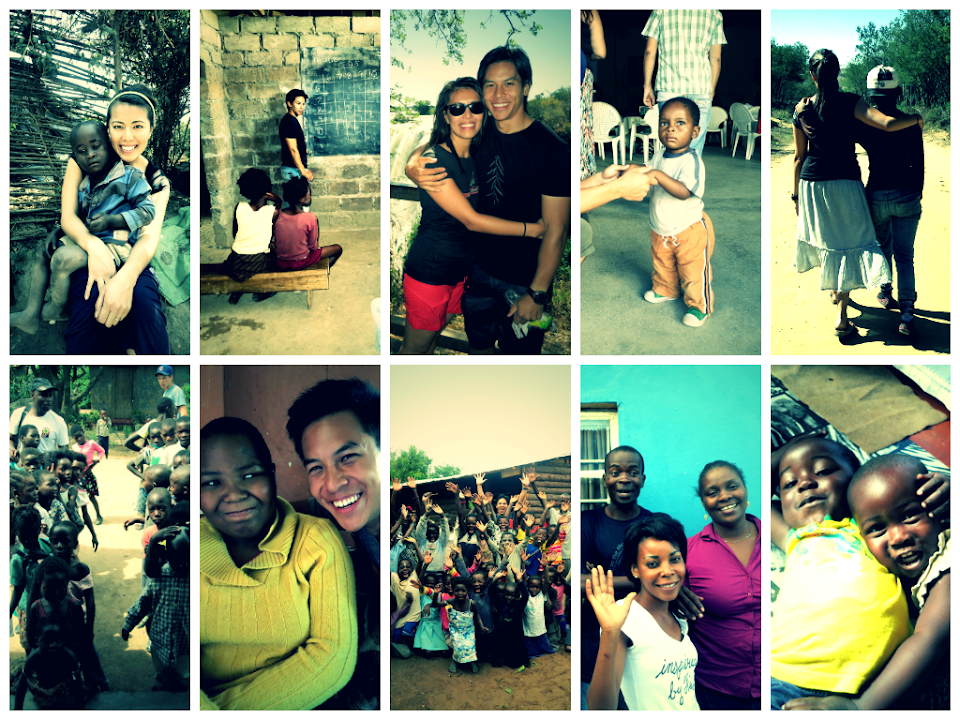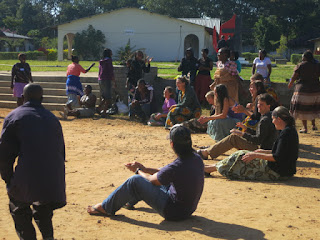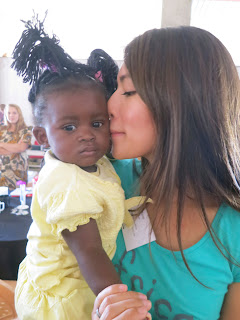I was informed of the situation the night before. Earlier in
the day, 3 little girls – ages 9, 7 and 2 – were taken from their home by
members of Hands at Work. The girls would spend the night at one of our
long-term volunteer couple’s home and, in the morning, I was to take them to
social services.
A week or so earlier, one of our visiting teams spent time
with a Community Based Organization (CBO) that Hands at Work partners with to
care for orphaned and vulnerable children. While playing with the children at
the Care Point, a few volunteers from the team noticed one girl that was
particularly withdrawn. It went beyond the mere shyness of a young girl; there
was something about her behaviour that seemed off.
Members of the team brought their concerns to Hands at Work
personnel who were accompanying the team on that day. They, in turn, addressed
the issue with the Care Workers of the CBO. The resulting conversation, and
what was revealed through it, was bigger than anyone could have anticipated.
The girl’s name is Annette (her name has been changed for
the purposes of this blog post), the 9-year old mentioned at the beginning of
this post. 7 years ago, she was raped by her father … the same father she continued
to live with until that day. It doesn’t take long to do the math – she was 2
years old at the time. Annette and her 2 sisters are a part of the CBO’s 3
Essential Services program meaning that, among other things, they are visited
in their home by the CBO Care Workers on a regular basis. On one of these home
visits, Annette’s mother disclosed to one of the Care Workers what had
happened. The mother, gripped by fear of the potential consequences of such
news leaking out into the wider community, made the Care Worker swear to
secrecy. The father’s brother, a known sangoma (witch doctor) within the
community, threatened death to anyone who interfered with their family affairs.
In an ideal world, our Care Workers, standing firm on the
foundation of Christ, would not be threatened by a sangoma and would understand
that sangomas have no power over them. However, the reality is that, in a
culture still so gripped by traditional beliefs, fear of the dark powers of
sangomas is still very much alive. Unfortunately, the effects of this type of
fear and its impact reach down to our children and threaten their safety and
wellbeing.
Annette is a glaring example. Her story, wrapped up in
secrecy and tossed aside for 7 years, is now only being discovered. 7 years of
living in fear, of having to endure the feelings of shame and worthlessness and
embarrassment, and having that compounded with the confusion that the ones
entrusted to her care were unwilling to step up and do anything about it. In an
ideal world, members of Hands at Work should not have been the ones to
intervene.
I prepared for the day like any other but knew that my heart
would likely be broken many times throughout the day. I approached the car
where the 3 little ones were already seated in the backseat. Their faces were
aglow with excitement and their laughter full of giddiness. I struggled to make
sense of the picture. Were they not scared to have been taken away from their
home and community? Were they not fearful of these strange foreigners were
around them? Were they not confused by where they were and what was going on? I
smiled at them and greeted them in Siswati and watched as their eyes lit up and
their laughter continued. It warmed my heart to see the 3 of them together,
bringing me a sense of peace in knowing that, at the very least, they had each
other.
My objective was clear. I was useful, partly because I have
familiarity and trust with our Clau Clau Service Centre team (who were the ones
tasked with advocating with social services for Annette and her sisters), but
mainly because I could drive. And I was fine with that. More than fine. As much
my heart broke for them and cried out for justice, and as much as I wanted to
play the role of hero in these girls’ lives, I understood that I was to remain
in the background as much as possible and allow our local team to handle the
matter.
We drove to the social service office where we sat for 1.5
hours. As it is with pretty much everything else in Africa, the process seemed
quite informal and lacked much structure. As Fortunate, our Clau Clau Service
Centre Coordinator, explained Annette’s situation to the social workers in
Siswati, I couldn’t help but wonder how much of what she was saying was
understood by Annette. The last thing I wanted to happen was for Annette to have
to re-live the experience again. Luckily, it seemed that the girls were more
than happy to entertain themselves.
After speaking with two different ladies in the office, the
head of the social work department sat down with us. Upon hearing Annette’s
story, he felt it appropriate to act immediately and followed us to the girls’
house to speak with their mother. As we were leaving the social work office,
Fortunate thanked me for being there and explained that, if I (or, more
specifically, my skin colour) had not been present, it’s likely we would have
received a much different response from the social workers. I found it odd,
given that each of the social workers we spoke to were black Africans, that I
would receive preferential treatment over a local. At the same time, I shouldn’t
really have been all that surprised. This is Africa, after all, where the
colour of your skin automatically groups you into a certain social class.
We arrived at the girls’ house with the head of the
department and one other social worker. With all the conversation happening in
Siswati, I didn’t know what was being said or, just as importantly, what wasn’t
being said. From what I gathered, the mother wasn’t exactly forthcoming in her
responses to the social workers’ questions. This prompted Fortunate to pull her
aside and speak to her one on one, imploring the mother to disclose the
complete truth. She then admitted to the incident that happened 7 years ago.
The rest of the conversation was scattered. At times, we
were told that there have been no further incidents of abuse. At others, we
were told that the father continues to be abusive – that he often comes home
drunk, beats the mother and chases the mother and the girls out of the house.
In a surprising turn of events, the father later showed up
at the house. This was especially surprising considering that, when members of
Hands at Work came to take the girls away a day earlier, the father never came
to the house, even though he was nearby and could see everything that was
happening. The fact that he would look on as a bystander and do absolutely
nothing as complete strangers took his 3 daughters away spoke volumes about the
type of father he is.
As the father answered questions from the social workers, I struggled
to control the resentment I felt for this man. I could not bring myself to
greet him, something which is an essential part of African etiquette. Every
time I looked at him, I felt as though I could burn a hole through his head
with my gaze. It couldn’t escape my mind that I was face to face with not only a
rapist, but a rapist of his own 2-year old daughter. At times, I sensed a
calling for grace and forgiveness but ultimately chose to ignore them. I knew
it was wrong but lacked the fortitude to do otherwise.
The father was prodded and questioned by the social worker
about the girls, their mother and their general wellbeing. The social worker
could not come straight out and accuse him of what happened 7 years ago but
instead tried to ask a bunch of indirect questions that would hopefully lead to
an admission of sorts. None came. When asked why Annette appears withdrawn, he
answered that it is because he does not have a job and cannot afford to buy his
family food or other things. When pressed further about signs of abuse, he
claimed that, when she was young, she slept at a neighbour’s place and, upon
returning from that neighbour’s place, she started to develop strange
behaviors. He also claimed not to know the reason for this.
The most disturbing response from the father came when he
was asked why Annette had made claims that her mother was being abused. His
response: when he is having sex with his wife, Annette attributes the sounds
coming from her mother as abuse, and such impressions are probably exacerbated by
the impacts of the abuse she suffered at her neighbour’s place. There were so
many things wrong with this response on so many levels that I don’t even know
where to begin. Unsurprisingly, the father revealed and admitted to nothing.
Nevertheless, the social workers explained that they still
needed to take Annette and her sisters away to assess their health and
wellbeing and so that further investigations could be done. When the girls were
told they would have to leave with the social workers, it was a difficult scene
to witness. As the girls were packing their stuff, the middle sister started
crying. I assumed that she was upset at having to leave home. I was told later
that the reason she was crying was not because she was leaving home but because
she didn’t want to go with the social workers. What she really wanted was to go
back with us to the Hands Village. I wanted nothing more than to take them back
with us but I knew this was not the solution. Annette, on the other hand,
looked quite pleased. She walked towards the car, bag in hand, with a big smile
on her face and without so much as even looking back at what she was leaving
behind.
The girls have now been placed in a “place of safety” (which
is the local term for a social services safehouse). While the accommodation is
not great, it was imperative that the girls were removed from their home and
remain separated from their father. The girls will later be taken to the clinic
to be assessed and the local child welfare department, in connection with the
police, will open up an investigation into this matter. Fortunately, the place
of safety is very close by the Hands Village so the members of Hands at Work
that have been involved in this process, including myself, can visit the girls
with relative ease.
The reason I share this story is because, in a way, it
represents so much of the reason why I am here. It encapsulates so much of who
Hands at Work is as an organization. In this situation, all I did was serve as
a driver. I did nothing heroic, nothing brilliant to coax social services into
responding, nothing to fix the greater issue at hand. But, as I continue to
learn and accept more and more every day, it’s not about me. And it never
should or will be. It’s not about what I can bring to the table, nor is it
about how many children I can save while I am here in Africa. While there are
times and situations where my education and skills will prove to be useful,
this was not one of them. Had I not been here, there undoubtedly would have
been someone else driving the girls in my place. I’m not irreplaceable, nor
will I ever be. But I am a part of something that I could never achieve on my
own, something much greater than myself. I’m participating in life with a group
of people who refuse to sit idly by while children like Annette live in constant
fear and brokenness and helplessness,people who recognize and respond to the immeasurable
value God places on each life.
In that one day I spent with those 3 little girls, my heart
broke at a level that I can’t explain. But through it all, I experienced some
of the core, defining values that I desire and choose to live my life by.
- Byron




































